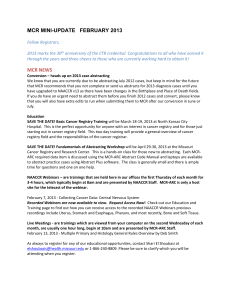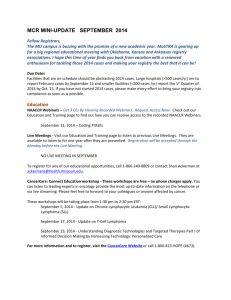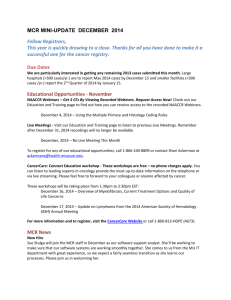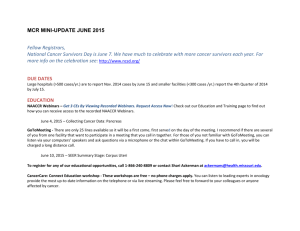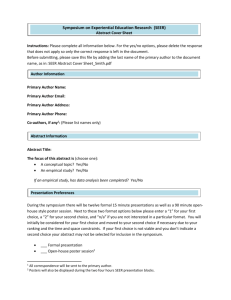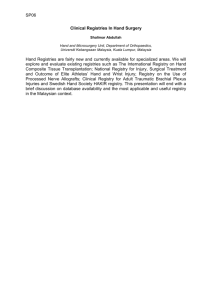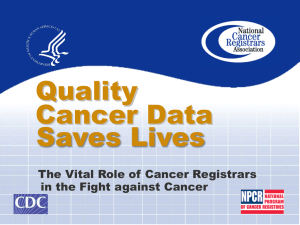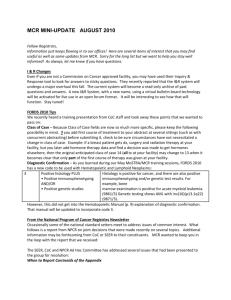Mini-Update - Missouri Cancer Registry and Research Center (MCR
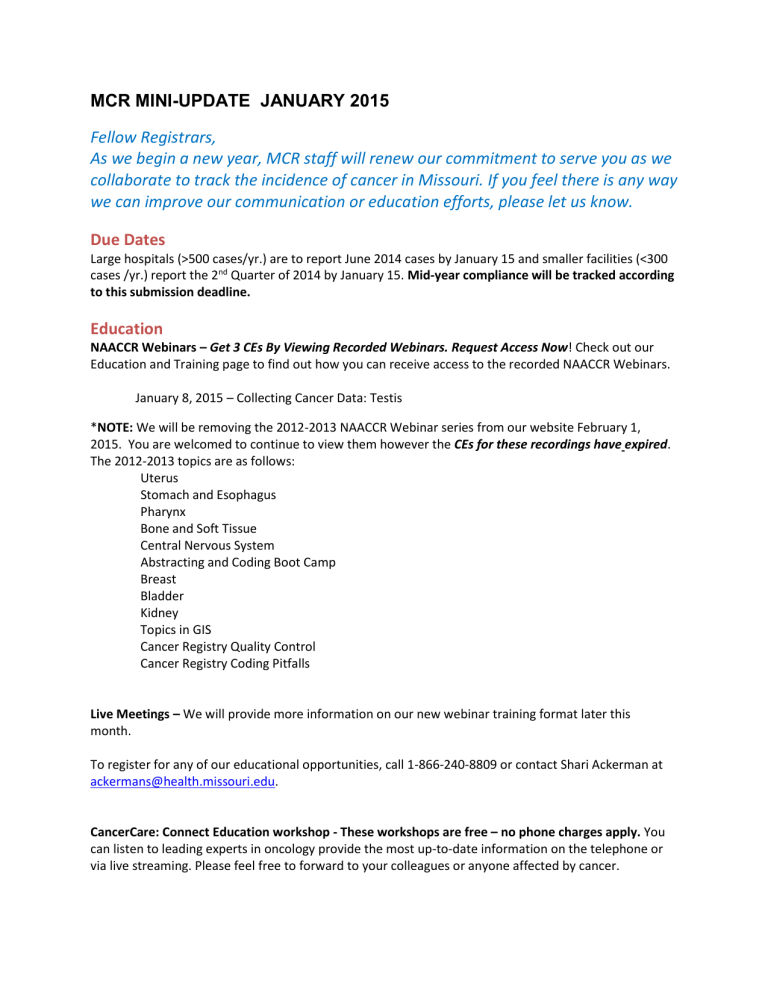
MCR MINI-UPDATE JANUARY 2015
Fellow Registrars,
As we begin a new year, MCR staff will renew our commitment to serve you as we collaborate to track the incidence of cancer in Missouri. If you feel there is any way we can improve our communication or education efforts, please let us know.
Due Dates
Large hospitals (>500 cases/yr.) are to report June 2014 cases by January 15 and smaller facilities (<300 cases /yr.) report the 2 nd Quarter of 2014 by January 15. Mid-year compliance will be tracked according to this submission deadline.
Education
NAACCR Webinars – Get 3 CEs By Viewing Recorded Webinars. Request Access Now! Check out our
Education and Training page to find out how you can receive access to the recorded NAACCR Webinars.
January 8, 2015 – Collecting Cancer Data: Testis
*NOTE: We will be removing the 2012-2013 NAACCR Webinar series from our website February 1,
2015. You are welcomed to continue to view them however the CEs for these recordings have expired.
The 2012-2013 topics are as follows:
Uterus
Stomach and Esophagus
Pharynx
Bone and Soft Tissue
Central Nervous System
Abstracting and Coding Boot Camp
Breast
Bladder
Kidney
Topics in GIS
Cancer Registry Quality Control
Cancer Registry Coding Pitfalls
Live Meetings – We will provide more information on our new webinar training format later this month.
To register for any of our educational opportunities, call 1-866-240-8809 or contact Shari Ackerman at ackermans@health.missouri.edu
.
CancerCare: Connect Education workshop - These workshops are free – no phone charges apply. You can listen to leading experts in oncology provide the most up-to-date information on the telephone or via live streaming. Please feel free to forward to your colleagues or anyone affected by cancer.
These workshops will be taking place from 1:30pm to 2:30pm/3:00pm EST:
January 7, 2015 – Medical Update on Pancreatic Cancer
January 14, 2015 – Coping with Stress of Caregiving When Your Loved One Has Myelofibrosis
January 22, 2015 – Update from the 2014 American Society of Hematology Annual Meeting
January 28, 2015 – The Latest Developments Reported at the 37 th Annual San Antonio Breast
Cancer Symposium
For more information and to register, visit the CancerCare Website or call 1-800-813-HOPE (4673).
MCR News
Casefinding List
The MCR website refers you to the SEER casefinding lists when you are setting up a Medical Record
Disease Index to find potential cancer cases in your patient census. Good news – the list has not changed for 2015, only the effective date has been updated.
Required Data Elements for 2015
An updated table of Required Data Elements for 2015 has been posted to the MCR website. Vendors will program your NAACCR v15 software accordingly.
Remember that in 2015, as part of the transition away from Collaborative Stage, MCR will:
Continue to receive CS system elements from all reporters (no changes)
Start collecting SEER Summary 2000 direct code (Item #759) from all reporters (See November
2014 MCR Update for tips on preparing your registry)
Receive specified TNM fields from CoC-accredited facilities
Also in 2015, we will add two required fields for all reporters at the request of NPCR:
RX Date Most Definitive Surgical Resection of the Primary Site
RX Date Most Definitive Surgery Flag
The MCR Manual will be revised to provide instructions for coding these fields which will be in line with those published in FORDS 2015 p. 214-215. These fields will help in the evaluation of clinical vs. pathologic stage.
2015 Software
NAACCR v15 compliant software is being developed by vendors and a national edit metafile is due out soon. As always, MCR will work with vendors on state-specific customizations so that you will have what you need to convert your software and report 2015 cases in July.
We don’t foresee any major delays or problems this year.
From Hospital to Central Registry
Reading the following article in the Dec. issue of Advance made me realize that many newer registrars may not fully understand differences in the work of the central registry compared to that of a hospital registry. Melinda does a nice of job of summarizing it. http://health-information.advanceweb.com/Columns/Registry-Perspectives/Hospital-Vs-Central-
Registry.aspx
Many years ago MCR did a presentation (similar to the one she describes) where we used example cases to show some of the decisions we need to make when consolidating multiple abstracts. Please let
Angela know if you think that would be useful to do again.
ABSTRACTING TIPS
Coding Inflammatory Carcinoma (per Ask a SEER Registrar)
Q: MP/H breast site-specific terms defines "Inflammatory breast carcinoma (IBC): A breast cancer with a distinctive clinical presentation believed to be due to lymphatic obstruction from an underlying invasive adenocarcinoma. The vast majority of cases have a prominent dermal lymphatic infiltration by tumor.
Dermal lymphatic infiltration without the characteristic clinical picture is insufficient to qualify as inflammatory carcinoma." Rule H22 says to use 8530 (inflammatory carcinoma) when "Final diagnosis of the pathology report specifically states inflammatory carcinoma". Please clarify, what histology code is used when the opposite of H22 occurs: the physician states a clinical presentation/diagnosis of inflammatory carcinoma with >50% skin involvement, but the final path report does NOT say inflammatory ca, but rather says invasive lobular carcinoma?
A: Inflammatory breast cancer is usually a clinical stage. The pathologist must state the tissue was actually inflammatory carcinoma or inflammatory adenocarcinoma for code 8530 to apply. In your scenario, code the histology to invasive lobular carcinoma (8520/3) and capture the inflammatory spread in the T designation of TNM staging (via CS Extension).
MO Personal History
Reminder: The primary being abstracted does not go in the personal history field – only previous and other subsequent primaries that you know about when abstracting. See the MCR Manual p.16 for a refresher on how to use this field.
Social Security Number Transpositions
Transposed numbers are too commonly found during record consolidation. It is very important in our work with data linkages that the SSN be correct. Please take a moment verify there are no typos on entry.
Chemo Drug Categories, per Ask a SEER Registrar
In SEER RX some drugs are active in more than one sub-category as designated by a hyphen. When comparing to another drug, they need to match at least one side of the hyphenated term to be considered in the same category.
Example: Oncovin is listed as an alkaloid-antimetabolite. Thus, it is in the same class when compared to
Velban (alkaloid) for purposes of assigning course of treatment. SINQ 09401
Neo-adjuvant Tx in MP/H, per Ask a SEER Registrar
Q: When applying the MP/H rules is it correct to use histology information from the most representative surgical sample, even if that surgery was done after neo-adjuvant tx?
A: Yes code the histology from the most representative specimen. Neo-adjuvant treatment usually does not affect the histology type. SINQ 9379
Standard Setter News
Announcing AJCC Registrar Curriculum
The American Joint Committee on Cancer (AJCC) proudly announces that “Curriculum for Registrars” will be coming in 2015 and will be designed to provide education in a step-wise learning environment complete with additional resources to reinforce the information and webinars with interactive quizzes
to prompt discussion and serve as a self-assessment for the information learned. You can visit the AJCC website to learn more about the Registrar Curriculum and stay informed. https://cancerstaging.org/CSE/Registrar/Pages/default.aspx
From NAACCR
The Global Initiative for Cancer Registry Development (GICR) recently launched a new website. Led by the International Agency for Research on Cancer (IARC), the GICR is collaboration between international partners to share knowledge and facilitate research to inform cancer control. The revised website describes the unified strategy developed to address global disparities in cancer information. The next phase of the initiative is also described, as it targets a growing number of low- and middle-income countries to identify their needs and provide the necessary support. The website outlines the significant progress made to date, including examples of the GICR's key activities and related resources to cancer registration and descriptive epidemiology. To visit the website, see http://gicr.iarc.fr/ .
CS Study Published by SEER
The National Cancer Institute is pleased to announce the publication of Collaborative Staging and Its
Impact on Cancer Registry Data: Information for Data Users on Analysis and Interpretation of Registry
Data in Cancer (Volume 120, Issue Supplement S23: December 1, 2014). The special issue describes the information collected under CSv1 and CSv2 within the SEER Program for eight common cancer sites.
Each report discusses how changes between the AJCC 6 th and 7 th editions affect stage distributions and trends, and then quantifies the potential impacts on outcomes and incidence trends stratified by stage.
SSFs are described in detail, with particular emphasis on the factors newly collected in 2010. Analyses are performed to evaluate the completeness and quality of each SSF.
Registry to Research
Trends in mastectomies for early-stage breast cancer (NCDB data) http://archsurg.jamanetwork.com/article.aspx?articleid=1921808&resultClick=3
Should small papillary thyroid cancer be observed? (SEER data) http://onlinelibrary.wiley.com/doi/10.1002/cncr.29123/abstract;jsessionid=D649414857B8F5EFC47F5D
2F646078B3.f04t01
Chemoradiation and survival in head & neck Merkel cell carcinoma (NCDB data) http://archotol.jamanetwork.com/article.aspx?articleid=2020430&resultClick=3
North America has highest cancer burden attributable to obesity (IARC data) http://www.practiceupdate.com/news/6557
Racial Disparities in Colon Cancer Survival (SEER data) http://annals.org/article.aspx?articleid=2023008
Colorectal Cancer and Cajun Americans (Louisiana Cancer Registry data) http://health-information.advanceweb.com/Features/Articles/Colorectal-Cancer-Cajun-
Americans.aspx?utm_campaign=1415909&utm_content=9568291158&utm_medium=email&utm_sourc e=Emailvision
Resources
Flexible chemo regimens for stage II colon cancer http://www.thelancet.com/journals/lanonc/article/PIIS1470-2045%2814%2970486-3/abstract
Using bariatric surgery to screen for endometrial cancer http://www.practiceupdate.com/News/6447/2/1/?elsca1=emc_enews_dailydigest&elsca2=email&elsca3=practiceupdate_onc&elsca4=oncology&elsca5=newsletter&rid=NTU2MjE4
MTE1NjYS1&lid=10332481
SLN mapping for early endometrial cancer http://www.practiceupdate.com/news/6468
Screening to identify myometrial sarcomas before resection http://www.practiceupdate.com/news/6471
Chemoradiation vs. radical cystectomy for T2-4aNOMO bladder cancer http://www.sciencedirect.com/science/article/pii/S1078143914003342
Hookah smoke increases benzene exposure http://www.medicalnewstoday.com/articles/285850.php
Study could end exclusion for HIV-related lymphomas http://www.practiceupdate.com/news/6531
Cyramza (ramucirumab) approved for Stomach, GEJ, and metastatic NSCLC http://www.practiceupdate.com/news/6565
Carcinogens tracked as they move through the body http://www.medicalnewstoday.com/releases/286886.php?tw
Clues uncovered about childhood leukemia http://www.medicalnewstoday.com/releases/286937.php?tw
Discovery of possible genetic link in pediatric leukemia treatment-related cognition issues http://www.medicalnewstoday.com/releases/286765.php?tw
Possible future biomarker for predicting prostate cancer metastasis http://www.thelancet.com/journals/lanonc/article/PIIS1470-2045%2814%2971113-1/abstract
Happy New Year!
Nancy H. Rold, CTR
Operations Manager
Missouri Cancer Registry and Research Center
